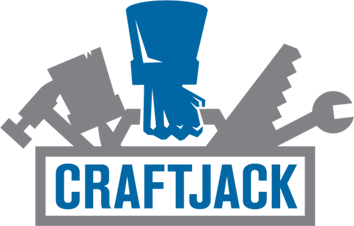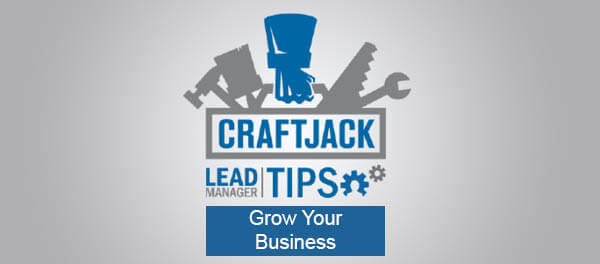7 Helpful Tips To Starting & Registering A Business

When you decide to take the leap of faith and start your own business, the challenges ahead can seem scary. Whether you’re an experienced pro or just starting out, becoming a business owner has some learning curves. You now have a responsibility larger than the task at hand, but to keep your business afloat.
Being a business owner can also be a great experience to lead others and do the work you want to do, the way you want to do it. You’re in charge! We’re here to help you make sure your business is set for success with these six tips.
If you’re a business owner who’s looking for more leads, sign up with CraftJack today to connect with homeowners.

1. Register Your Business
Before you start on a job, be sure to complete the paperwork necessary for your business. The first step, after selecting your business name, is to register your business with your local government. This is the process of registering your DBA or “doing business as” name. Having a DBA is a requirement for any legal documents going forward.
Every state has different registry requirements. You’ll need to check with your specific state to see what you’ll need to do for your trade and business type.
While smaller businesses such as a single owner operator can work off a social security number, if you plan on growing, you’ll need to acquire a Tax ID, both locally and federally. This is especially important if you have employees. Regionally, you’ll have to research your state and fill out an application and provide required materials. When you register for your federal Tax ID number, or EIN, you must be able to show proof of eligibility, such as a social security number. This process can be completed online at the IRS website.
For any independent business owner, registration is typically the minimum requirement for starting your business. Of course, this depends on region, but it’s highly important to complete before moving forward as a business.
2. Create A Business Plan
For any business in any trade, a business plan is a must. This helps to properly think through business goals and plans you hope to achieve with the work you do. These goals can be both short- or long-term goals, but should be explained in writing.
You might wonder why this step is important as a contractor. Having a strategic plan with sensible goals can be helpful to evaluate the growth of your business. You’ll have a document to reference when questions arise and can help you prepare to move forward. The Small Business Association recommends these topics be outlined in your business plan:
- Executive Summary: A short introduction of what’s included in the document and your mission statement.
- Company Description: A short paragraph evaluating who you are, what you do and company values.
- Market Analysis: An explanation of your industry and your competitors
- Organization: If company is more than two employees, it’s a good idea to outline responsibilities.
- Services Provided: A description of the service you provide and why customers may need it
- Marketing Plan: You’ll need to get your name out there! Write a few paragraphs on how you plan to spread the word about your business.
- Financial Goals: Record financial projections for the next 3 to 5 years
- Appendix: Any additional information, like licenses and registration, that you might need to store with business documents.
3. Check With Local Ordinances & Codes
You may have registered your business, but it’s always important to check and see if your business is up to date with any local ordinance and codes, depending on your specific trade. If you’re a plumbing, HVAC or electrical pro, many states have licensing requirements for these trades so you’ll want to check and see what’s necessary.

4. Get Insured
In many cases, general liability insurance is a must for contractors. This protects you if there is an accident or damage to work. However, this typically only applies to the individual and it’s up to you to make sure your sub-contractors and employees get the same.
To protect your business, insurance providers also offer a business owners policy for small businesses that typically include property and worker’s compensation coverage. Other coverages can be added on depending on your trade and what you’d like covered.
5. Build Your Brand
Now that you have a business name, it’s time to start creating an identifiable brand. This not only helps let your customers know who you are, but it’s a great way to represent your business and truly make it official. You can create a simple logo or have one designed. Logos are important as you can use them on business cards, estimates and other printable material. Consider if you want your employees to wear matching company t-shirts or uniforms to reflect the professionalism of your company. This is a great place for your company logo as well.
In addition, you’ll want to get your website all set up so potential customers can easily find you. See What Customers Are Looking For On Your Website to learn more about what you need to include to reach the customer and win the job.

6. Hire & Manage Employees
By owning your own business, you now have the ability to hire and train your own employees. It’s a good idea to develop an employee handbook or guidelines so they understand the expectations when they’re on the job.
Plan ahead to know how much each employee will cost you to determine how much you’ll need to make from a job in order to make a profit. This may vary per job, but plan ahead where you can.
Business owners are leaders. Be sure to hone in on your leadership skill development as you learn more of what it’s like to run a business. Evaluate how you can better communicate with others and what each team member needs to succeed. These skills will have long-term impact on your overall business goals.
7. Get More Leads
As a new business, you’ll want to focus on getting more leads and winning the job. Begin to network and get your name out there to prospective customers. CraftJack can help by sending you leads in real time, so you can connect with customers and win more jobs. Utilize all your resources as you get your business started and pretty soon, your schedule will be full of new jobs.
Conclusion
Starting a business can be a daunting task. There are many things to consider in order to be successful, both on and off the job. While this is a new responsibility, it’s a rewarding undertaking that will have a huge payoff for years to come.



